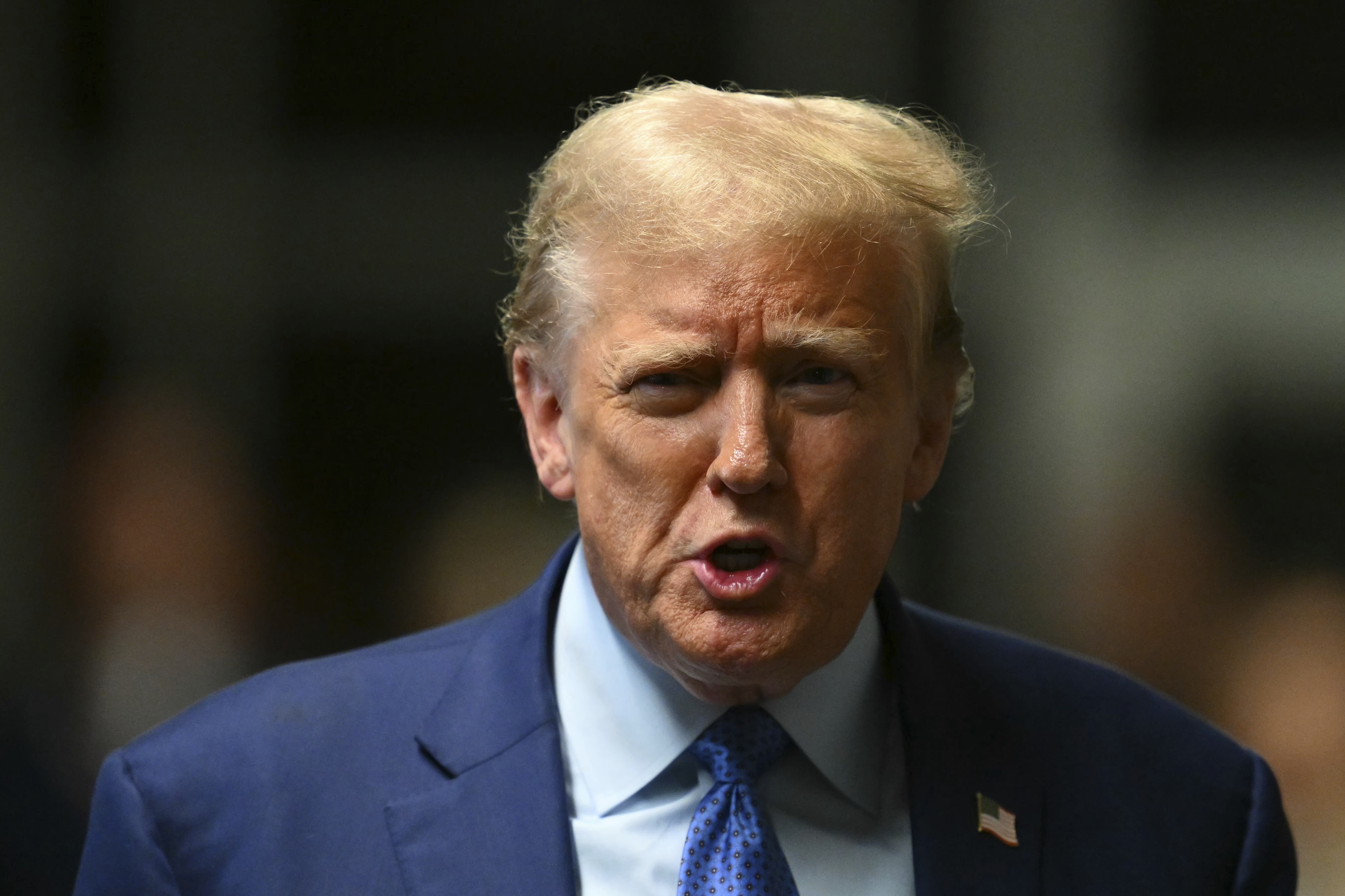Israel's prime minister on Monday unveiled what he said was a "half ton" of Iranian nuclear documents collected by Israeli intelligence, claiming it proved that Iranian leaders covered up a nuclear weapons program before signing a deal with world powers in 2015.
In a speech delivered in English and relying on his trademark use of visual aids, Prime Minister Benjamin Netanyahu claimed the material showed that Iran cannot be trusted, and encouraged President Donald Trump to withdraw from the deal next month.
"Iran lied big time," Netanyahu declared.
In Washington, Trump said it vindicated his past criticism of the nuclear deal.
U.S. Secretary of State Mike Pompeo said later that the U.S. had been aware of the documents "for a while" and that he and Netanyahu discussed them during their meeting in Tel Aviv on Sunday.
Speaking with reporters while flying back to the U.S., Pompeo said that although the existence of Iran's nuclear arms program had been public knowledge for years, the documents give new detail about its scope and scale and prove Iran was lying when it claimed never to have been pursuing nuclear weapons.
"This will belie any notion that there wasn't a program," Pompeo said.
U.S. & World
He issued a statement later saying Iran also lied to the six nations with which it negotiated the nuclear agreement.
"What this means is the deal was not constructed on a foundation of good faith or transparency. It was built on Iran's lies," the statement said.
Iran's deception is inconsistent with its pledge in the nuclear deal "that under no circumstances will Iran ever seek, develop or acquire any nuclear weapons," Pompeo said, adding that the U.S. is now assessing what the documents mean for the nuclear deal.
Netanyahu's presentation, delivered on live TV from Israeli military headquarters in Tel Aviv, did not appear to provide evidence that Iran has violated the 2015 deal, raising questions about whether it would sway international opinion ahead of Trump's decision.
The U.S.-led agreement offered Iran relief from crippling sanctions in exchange for curbs on its nuclear program.
Netanyahu furiously fought the deal while President Barack Obama was negotiating it, and he has been a leading critic since it was signed. He says it does not provide sufficient safeguards to prevent Iran from reaching nuclear weapons capability.
Netanyahu has found a welcome partner in Trump, who has called the agreement "the worst deal ever."
Trump has signaled he will pull out of the agreement by May 12 unless it is revised, but he faces intense pressure from European allies not to do so. Netanyahu said he already has given the information to the U.S., and he plans to share it with Western allies and the international nuclear agency.
Ahead of the announcement, Iran's foreign minister, Mohammad Javad Zarif, belittled Netanyahu in a tweet, saying: "The boy who can't stop crying wolf is at it again."
He later tweeted: "Pres. Trump is jumping on a rehash of old allegations already dealt with by the IAEA to 'nix' the deal. How convenient. Coordinated timing of alleged intelligence revelations by the boy who cries wolf just days before May 12. But Trump's impetuousness to celebrate blew the cover."
Iran's deputy foreign minister and senior nuclear negotiator, Abbas Araghchi, called Netanyahu's presentation "childish and ridiculous" and said the purported evidence was "fake and fabricated."
Iran has denied ever seeking nuclear weapons.
The exchange ratcheted up already heightened tensions between Israel and Iran. Israel considers Iran to be its biggest threat, citing Tehran's hostile rhetoric, support for militants and growing influence in the region.
Israel has said it will not allow Iran to establish a permanent military presence in neighboring Syria, where Iran supports President Bashar Assad. Overnight Monday, a missile attack in northern Syria killed more than a dozen pro-government fighters, many of them Iranians, a war monitoring group and an Iranian news agency said.
There was no official confirmation of the death toll or the target. But Israel was widely suspected of being behind the attack.
In his presentation, Netanyahu said Israel had obtained some 55,000 pages of documents and 183 CDs of secret information from an Iranian nuclear weapons program called "Project Amad." He said the material was gathered from a facility in the Tehran neighborhood of Shourabad a few weeks ago "in a great intelligence achievement."
He said the uncovered filed included "incriminating" documents, charts, blueprints, photos and videos. He pointed to one presentation that allegedly called for producing and testing five warheads.
The authenticity of the documents could not be verified, and it was not clear whether they shed any new light on what international inspectors already have concluded. The documents appeared to date back to the early 2000s, when international inspectors already believe Iran was pursuing a weapons program.
A 2015 report by the International Atomic Energy Agency, for example, concluded that Iran "conducted computer modeling of a nuclear explosive device" before 2005 and between 2005 and 2009. It said, however, that those calculations were "incomplete and fragmented."
Netanyahu provided no direct evidence that Iran has violated the 2015 deal. But he said the existence of the documents proves Iran is waiting to resume its race to build a bomb.
"We can now prove that Project Amad was a comprehensive program to design, build and test nuclear weapons," he said. "We can also prove that Iran is secretly storing Project Amad material to use at a time of its choice to develop nuclear weapons."
He said that after the project was disbanded in 2003, its director, Mohsen Fakhrizadeh, continued his work under another agency called Sapan.
Netanyahu said the material proves the international nuclear deal is a failure. He said it allows Iran to continue enriching some uranium, and does not address its research efforts or development of long-range ballistic missiles.
He noted that Trump was weighing whether to pull the U.S. out of the nuclear deal, saying "I am sure he will do the right thing."
At the White House, Trump praised Netanyahu's presentation and said it vindicated the president's past statements about Iran and the shortcomings of the nuclear deal, adding that recent events have "really shown that I've been 100 percent right." Although Trump was hosting Nigeria's president for a visit during Netanyahu's speech Monday, he said he watched part of it on television.
"That is just not an acceptable situation," Trump said. He declined to say whether he'll pull out of the deal on May 12 but said that even if he does, "that doesn't mean I wouldn't then negotiate a real agreement."
Trump has set a May 12 deadline to decide whether to pull out of the Iran deal — something he appears likely to do despite heavy pressure to stay in from European allies and other parties.
Both Trump and Netanyahu say the deal should address Iranian support for militants across the region and Iran's development of long-range ballistic missiles, as well as eliminate provisions that expire over the next decade.
Netanyahu's office later issued a statement saying the prime minister had spoken with German Chancellor Angela Merkel and French President Emmanuel Macron, and agreed to share the intelligence with them. He also spoke with Russian President Vladimir Putin about the findings.
The European Union's foreign policy chief, Federica Mogherini, issued a statement saying Netanyahu's presentation will be assessed.
"I have not seen from Prime Minister Netanyahu arguments for the moment on non-compliance, meaning violation by Iran of its nuclear commitments under the (nuclear) deal," she said.
Associated Press writers Amir Vahdat, Nasser Karimi, Josh Lederman and Matthew Lee contributed to this report.



